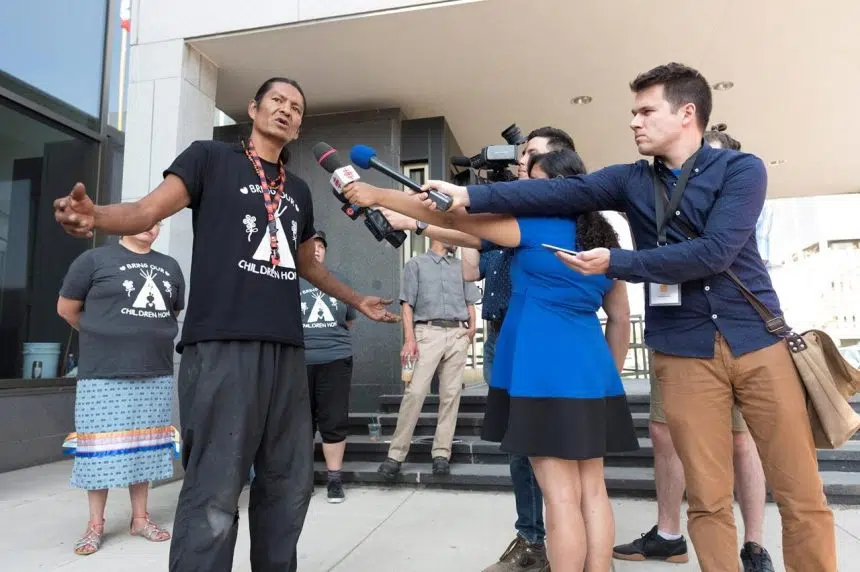By Ryan McKenna, The Canadian Press
REGINA — A judge has reserved her decision on the request by the Saskatchewan government for an order to evict Indigenous protesters who have been camping in teepees on the legislature grounds.
Justice Ysanne Wilkinson of Court of Queen’s Bench heard arguments Thursday from both sides on what should happen to the Justice For Our Stolen Children camp.
The government contends the protesters are breaking bylaws and making it hard for the province to maintain the land across from the legislature building.
“This case is not about whether the protesters are advocating for an honourable cause,” government lawyer Michael Morris told a packed courtroom.
“It is not about whether there are too many Indigenous children in foster care. It is not about whether the criminal justice system is fair for Indigenous people.
“This case is about the government’s ability to regulate, maintain land in Wascana Centre.”
The first teepee went up six months ago and more have been set up as campers protest what they say is racial injustice and the disproportionate number of Indigenous children apprehended by child-welfare workers.
Morris said the government has received several complaints about the camp and that public safety needs to be considered.
The protesters were immediately told they had to leave.
Morris said they were given numerous trespassing notices and police moved in June 18 to dismantle the camp. Six people were arrested but never charged.
The camp was set up again two days later and police have held off ever since.
Nine events have had to be relocated because of the camp, including part of the province’s Canada Day celebration.
Protesters have filed a court application of their own seeking to have the six arrests made during the June eviction declared illegal.
Meara Conway, a lawyer representing the protesters, said the arrests were a “dismal day for democracy in Saskatchewan.”
Wilkinson is giving lawyer Dan LeBlanc, another lawyer representing the protesters, one week to submit further documents pertaining to his case against the arrests.
LeBlanc told court Regina police Chief Evan Bray has already concluded the camp does not pose a safety risk. He added that the case is about freedom of speech.
“The government bears the burden of convincing you that its infringement is justified,” LeBlanc said.
Katrina Swan, a lawyer for the Regina Police Service, acknowledged that there was pressure on the police from the government to dismantle the camp in June.
One of the arguments that government lawyers raised and was echoed by the judge is why the protesters never applied for a permit to stay on the legislative grounds.
Outside court, LeBlanc said the judge will have to weigh that as she ponders her decision.
“It’s true there’s no record of the people applying for permits before,” he said. “There’s certainly appeal level decisions from across Canada which say that’s not conclusive on the answer.”
Also outside court, protester Richelle Dubois said that it’s important to have the camp on the legislature grounds.
Her 14-year-old son, Haven, died in 2015 from what was ruled an accidental drowning. Dubois has never accepted that conclusion.
“It’s a healing place for families like myself for the stories of situations like my son’s,” she said.
— Follow @RyanBMcKenna on Twitter







